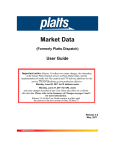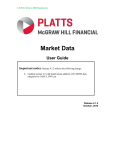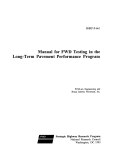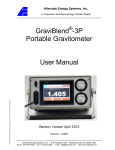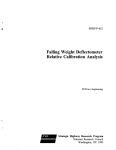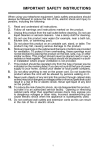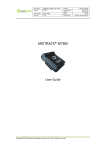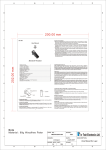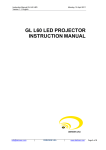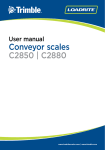Download Dispatch
Transcript
Dispatch User Guide Release 2.4 September, 2010 Summary of Changes Release 2.4 New cuts added - „Early US Power/Natural Gas‟ cut at 5pm (dispatch categories DP, EB, GM and GN only), and „M2M backup‟ cuts at 8:40 and 11:40pm US Eastern time (categories GP, GP, MP and MQ) – Sections 2.1, 2.2 „Early Flow Date‟ cut adjusted to replace the „flow date‟ dispatch categories, which have been discontinued, with the corresponding „regular‟ categories. Also, files which update in this cut have been expanded to include all dispatch categories for which Platts regularly publishes future-dated prices – § 2.5 Expanded facilities for locating Platts symbols – § 5.2 Illustrations updated to reflect format changes on www.platts.com . Release 2.3 As-of times for all cuts moved back 40 minutes, thus providing earlier access to prices which update near the end of the Platts Editorial day – § 2.1 New „Early Asia‟ cut makes most Asia prices available to subscribers three hours earlier than previously – § 2.1 Improved ftp.platts.com redundancy/backup facilities eliminate the need for ftphts.platts.com as a separate backup site - § 1.2 Weekly symbol files available in both text and comma-delimited format from ftp.platts.com either using subscriber user-id‟s or via anonymous login – Sections 1.2-3, 5.2.1, 5.2.3 Single login to both www.platts.com and www.online.platts.com – § 1.3 Previous-day „Extended-final‟ Dispatch CSV files now available along with current-day files at www.online.platts.com – Sections 1.3, 2.4 Release 2.2 Extended/revised format for North American power and natural gas Dispatch CSV files, including M2M – Appendix B. Note that this new format includes changes to the format currently used for M2M CSV files. Additions to symbol list files posted weekly to ftp.platts.com - Sections 1.2-3, 5.2 Anticipated future use of special values to indicate prices missing due to holidays, etc – § 2.2 Release 2.1 Complete rewrite of original 1999-2002 FTP Dispatch User Manual Release of Dispatch CSV 2 Table of Contents 1 INTRODUCTION............................................................................................................................... 4 1.1 1.2 1.3 2 DISPATCH SCHEDULES ................................................................................................................15 2.1 2.2 2.3 2.4 2.5 3 INTRODUCTION............................................................................................................................19 HEADER RECORDS ......................................................................................................................19 „N‟ (NEW) ENTRIES .....................................................................................................................20 „F‟ (FUTURE-DATED) ENTRIES ....................................................................................................20 „C‟ (CHANGE OR CORRECTION) ENTRIES ....................................................................................21 „D‟ (DELETE) ENTRIES ................................................................................................................21 „X‟ (NO PUBLISHED PRICE) ENTRIES ..........................................................................................22 MULTIPLE ENTRIES IN .FTP FILES FOR THE SAME SYMBOL/BATE/DATE ........................................22 TRANSACTION ENTRIES IN POSTCLOSE FILES ..............................................................................22 BATES IN FTP DISPATCH FILES ...................................................................................................23 DISPATCH CSV PRICE FILE FORMAT......................................................................................24 4.1 4.2 4.3 5 DISPATCH SCHEDULES GENERAL INFORMATION .........................................................................15 GENERAL DISPATCH FILE NOTES ................................................................................................16 FTP DISPATCH NOTES ................................................................................................................17 DISPATCH CSV NOTES................................................................................................................17 „FLOW DATE‟ AND FUTURE-DATED PRICES, AND THE 1:15AM DISPATCH CUT ...........................18 FTP DISPATCH PRICE FILE FORMATS ....................................................................................19 3.1 3.2 3.3 3.4 3.5 3.6 3.7 3.8 3.9 3.10 4 PLATTS MARKET PRICE DATA/DELIVERY .................................................................................... 4 PLATTS FTP DISPATCH SERVICE .................................................................................................. 5 PLATTS DISPATCH CSV SERVICE ................................................................................................10 INTRODUCTION............................................................................................................................24 HEADER RECORDS ......................................................................................................................24 DATA RECORDS ..........................................................................................................................24 DISPATCH SYMBOL LIST AND PRICE-HISTORY FILE FORMATS ...................................26 5.1 INTRODUCTION............................................................................................................................26 5.2 SYMBOL LIST FILES ....................................................................................................................26 5.2.1 FTP Dispatch Symbol List Files ............................................................................................26 5.2.2 Dispatch CSV Symbol List Files ............................................................................................27 5.2.3 “This Week” Symbol Files.....................................................................................................28 5.2.4 Symbol Directories on www.platts.com .................................................................................29 5.2.5 Symbol cross-references for selected Platts print services ....................................................30 5.3 HISTORY FILES ............................................................................................................................31 5.3.1 FTP Dispatch History Files ...................................................................................................31 5.3.2 Dispatch CSV History Files ...................................................................................................32 A APPENDIX A – BATE, FREQUENCY, CURRENCY AND UNIT OF MEASURE CODES ....33 A.1 A.2 A.3 A.4 B BATE CODES ...............................................................................................................................33 ASSESSMENT FREQUENCY CODES ...............................................................................................33 CURRENCY CODES ......................................................................................................................33 UNIT OF MEASURE CODES ..........................................................................................................34 APPENDIX B – CSV FILE FORMAT FOR POWER, NATURAL GAS CATEGORIES .........35 B.1 B.2 INTRODUCTION............................................................................................................................35 ADDITIONAL FIELDS ...................................................................................................................36 3 1 1.1 Introduction Platts Market Price Data/Delivery In addition to the prices published in print and online news/alert services, Platts provides two services for delivering market price data to subscribers: The database access option for real-time news services such as Platts Global Alert. Platts Dispatch, which enables subscribers to retrieve market price data files, updated several times each day, via the internet. This is the User Guide for Platts Dispatch. Subscribers may receive price data directly from Platts or via many other information providers serving energy and metals markets. For more information on other sources of Platts data, visit www.platts.com and choose „Delivery Platforms & Partners‟ from the „Products & Services‟ menu: Platts price reporters monitor trading activity in petroleum, natural gas, petrochemicals, power and other markets worldwide. They collect information on market activity and use standard methodologies to prepare price assessments and indexes. Platts also collects price, statistical and other data directly from government agencies, companies, energy traders and exchanges, and other 3rd-party sources. Currently, 75-80,000 price values update on a typical weekday, rising to 120,000+ during monthly peak periods. Platts identifies Dispatch price values by a 7-character symbol, a 1-character „bate‟ (value type indicator – high price, low price, closing price, volume, etc) and an assessment (as-of) date. Prices distributed each day may include current-day or prior-day prices being published for the first time, as well as corrections to previously-published prices. Symbols are grouped into dispatch categories based on their product and/or regional characteristics. Examples include Lubricants (worldwide), US power, European petroleum products, and 160+ others. A dispatch category is the smallest standard „package‟ available to Platts price data subscribers. For a current list of available dispatch categories, choose „Price Symbol & Page Directories‟ from the „Methodology & Reference‟ menu illustrated above, and then see the „Directories & Disp Cats‟ tab in the „directions‟ link: Price data is grouped for delivery to real-time data subscribers into data packages, sub-packages and add-on packages. Each package consists of one or more dispatch categories. Examples include „PGAData‟, containing petroleum-related categories aligned with the Platts Global Alert service, and „EPAData‟, containing European power-related categories aligned with the Platts European Power Alert service. For more information on data packaging, contact your Platts Sales representative. Real-time data subscribers receive price updates at the same time they go into the Platts database. Platts Dispatch subscribers receive them by downloading price data files from the Platts FTP site 4 or website; there‟s a separate file for each dispatch category. These files are refreshed several times each day as markets close around the world. Platts Dispatch provides subscribers with two options for receiving Platts assessments and other market price data: Text files delivered via the Platts FTP site, ftp.platts.com . This service is designed for subscribers and vendor partners who maintain their own databases of Platts price data. Comma-delimited (.csv) files delivered via the Platts website, www.platts.com. These files are more suitable for end-users of Platts price data, who may not have extensive technology support or expertise in FTP client software. They are formatted for direct use in desktop applications such as spreadsheets. The next two sections provide an introduction to each option. Chapter 2 provides detailed information on Dispatch update schedules. Chapters 3 and 4 provide complete information on the daily file types and data formats available via each of the two delivery options. Chapter 5 provides information on Dispatch symbol-list and other options for locating Platts symbols, as well as format and other information on price history data files. The appendices to this User Guide provide information on codes used in Dispatch files, and special formatting information related to Dispatch .CSV files for North American power and natural gas dispatch categories. 1.2 Platts FTP Dispatch Service FTP Dispatch price data files can be retrieved from the Platts FTP site using either FTP scripts run from a scheduler, or one of the many available desktop FTP software packages, e.g.: 5 As shown in the illustration above, you must enter your FTP Dispatch user-id and password, which are assigned by Platts, to obtain access to price data. The primary site for the FTP Dispatch service is ftp.platts.com . Once you have logged in successfully, the system gives you access to a set of folders which contain current and recent historical price files for all the dispatch categories included in your subscription: Starting at 8:15am US Eastern local time, the „today‟ folder will always contain the most recently-updated price data available to FTP Dispatch subscribers for the remainder of the Platts editorial day, which ends with the „Final‟ files posted at 8:15pm. If you miss or need to reprocess any recent Dispatch files, copies of „Final‟ files for the most recent 45 days are archived in folders whose „yyyymmdd‟ names indicate the date. Price updates are posted to the „postclose‟ folder at 10:15pm and 1:15am. The „symbols‟ folder provides access to files, updated weekly, containing lists of Platts symbols. Chapter 2 provides complete information on update schedules for the files in each folder. In addition to „batch‟ and desktop FTP software, files can also be retrieved from the Platts FTP site using many web browsers. Most subscribers access Dispatch files using automated FTP scripts run at predetermined times by a scheduling system. You may need to obtain assistance from your Technology group to set up and manage these scripts. Regardless of which approach you decide to use, there may also be other technical issues, such as obtaining access to external FTP sites through corporate network firewalls. Again, you should contact your local Technology group for assistance if necessary. 6 Once you have logged into the Platts FTP site, opening any folder displays all the dispatch category files authorized under your subscription: Each file contains all the price updates so far today for the symbols in that dispatch category: 7 If the contents of an FTP Dispatch file appear garbled … … you may need to select the ASCII option in your FTP client software to adjust the format: In addition to price files, descriptive information on all the symbols in every dispatch category can also be retrieved from ftp.platts.com. In addition to the „symbols‟ folder described above when you log in with a subscriber user-id, FTP Dispatch symbol-list files for all categories, updated each weekend, are available via anonymous login: 8 The /pub/symbols folder contains a text file with a .sym extension for each active category in FTP Dispatch: Similar to price files, each .sym files contains descriptive information on all the symbols in that dispatch category: In addition to .sym files for each dispatch category, a separate file in the same folder – dispatch_category_descriptions.txt – provides a complete list of all active dispatch categories: The /pub/symbols/csv-version folder on ftp.platts.com contains another set of symbol in commadelimited (.csv) format: See Sections 1.3 and 5.2.2 for more information on .csv-format symbol list files. 9 The csv-version folder also contains a separate file, dispatch_category_descriptions.csv, containing a master list of all dispatch categories. Here‟s an illustration of that file when opened in a spreadsheet application: Depending on your requirements, FTP Dispatch price and symbol files can be downloaded individually, or scripts can be set up using the FTP „mget‟ command to retrieve all available files. Chapters 3 and 5 provide complete information on the format and content of FTP Dispatch price and symbol files, respectively. 1.3 Platts Dispatch CSV Service The Platts Dispatch CSV service allows end-users of Platts assessments and other market price data to import the data directly into desktop applications such as spreadsheets. The web site for Dispatch CSV can be reached either via the „Access My Subscriptions‟ link at www.platts.com after you have logged into the site … 10 … or directly at www.online.platts.com : Like FTP Dispatch, Dispatch CSV requires a user-id and password, which are assigned by Platts. After you have successfully logged in, you will see the „My Subscriptions‟ page: 11 As you scroll down, you will see all the online news and data files for the services you have subscribed to, and be able to access them by double-clicking their links. These files are divided into two sections - newsletters and associated price data files … … and Dispatch CSV (comma-separated-variable) data files: Depending on the services associated with your user-id, you may see several types of files: Copies of newsletters you subscribe to, in the „Latest HTML‟ and „Latest PDF‟ columns. Price data files in the „Latest‟ and „Yesterday‟ columns for the dispatch categories whose prices appear in that newsletter. These „newsletter bundle‟ comma-delimited (.csv) files will typically contain prices for several dispatch categories in a single file. The „Dispatch‟ section contains a separate comma-delimited file for each dispatch category you have subscribed to. The „Latest‟, „Yesterday‟ and ‟45-day‟ files have equivalent contents in both sections. The „Latest‟ files are always the most recently updated available versions of the Dispatch .CSV files. Starting at 7:35am US Eastern time each weekday, „Yesterday‟ files contain copies of the final Dispatch .CSV files from the previous weekday. The ‟45-day‟ files contain all price updates for the most recent 45 day period for the dispatch category or „Newsletter bundle‟ in the „Latest CSV‟ column. The file has in the same .csv format as the „Latest‟ and „Yesterday‟ files, but is posted in compressed (.zip) format, since some of these files can be rather large. The „Symbols‟ files, which are updated each Monday, provide complete descriptive information for the symbols in the corresponding price files. See Chapter 2 for complete information on update schedules for all Dispatch files. To view the contents of any Dispatch price or symbol file, just double-click on it: : : 12 In this example, the .csv file format has been associated with a spreadsheet software package, so the file opens directly in that application: Once the file is open, all the facilities of the application are immediately available to work with the contents of the file. For example, to sort the file by symbol description, you might choose „Sort‟ from the „Data‟ command on the toolbar, and select column C: 13 The result: Symbol files (the links under the „Symbols‟ column on the website) are equally easy to work with at your desktop; double-clicking on the symbol file for dispatch category CS displays: Chapter 4 provides complete information on the content and format of daily Dispatch CSV price files; also see Appendix B for information on the extended versions of these files for North American power and natural gas dispatch categories. Chapter 5 provides the same information for symbol and other Dispatch CSV data files. In addition to the individual symbol files for the „newsletter data bundles‟ and dispatch categories available to you on the Platts website, symbol files for all dispatch categories, including ones you don‟t subscribe to, are available via anonymous login from the Platts FTP site. See § 1.2 for more information on obtaining symbol files from ftp.platts.com . 14 2 Dispatch Schedules 2.1 Dispatch Schedules General Information FTP Dispatch and Dispatch CSV price files are rebuilt and posted several times every weekday (Monday – Friday, including holidays). Symbol files are updated each weekend. Most „Dispatch cuts‟ are timed to coincide with the end of the Platts Editorial day in each of the major trading regions, as follows: Data ‘asof’ Time 7:40am 10:40am 3:40pm 5:00pm 6:40pm 7:40pm 8:40pm 9:40pm 9:40pm 11:40pm 9:40pm 12:40am Type File Label Early Asia Asia Europe Early Power/Natgas Early US Final (FTP and CSV) M2M Backup #1 Extended Final (CSV only) Postclose (FTP only) M2M Backup #2 45-Day History (CSV only) Early Flow Date Time file is Available 8:15am 11:15am 4:15pm 5:35pm 7:15pm 8:15pm 9:15pm 10:15pm 10:15pm 12:15am 1:00am 1:15am Regular Regular Regular Regular Regular Regular Regular n/a Postclose Regular n/a Postclose ASIA_PM ASIA EMEA EARLY_PNG N_AMER_PM FINAL FINAL FINAL POSTCLOSE FINAL FINAL N_AMER_AM Symbol files (weekly) 7:00pm Sat 5:00pm Sat n/a n/a Dispatch Cut All times in the table above are US Eastern local times. The corresponding GMT (Greenwich Mean Time) or UTC (Universal Time Coordinated) times are four hours later during Daylight Saving time in the US (roughly March-November), and five hours later during US Standard time. The „Available‟ time is the latest time files will be posted. Files should not be retrieved before these times, since files for some dispatch categories are regenerated closer to the „available‟ times to enable subscribers to receive prices which regularly update after the as-of time for the cut. Also, Platts does not guarantee availability before the stated „available‟ times. As indicated in the „Data as-of‟ column, the price data in each cut reflects all updates to the Platts market price database through 35 minutes before the „Available‟ time. E.g. the prices in Final cut files, available to subscribers at 8:15pm US Eastern time, reflect updates to the database though 7:40pm. FTP Dispatch and Dispatch CSV price files reflect all updates between 7:40pm US Eastern time the previous weekday (Monday – Friday) and the as-of time for the cut. E.g. the Europe cut for January 30, 2007 reflects all updates between 7:40pm January 29 and 3:40pm January 30. Exception: FTP Dispatch Postclose files posted at 10:15pm contain only prices which updated between 7:40 and 9:40pm on the current day. Also see § 2.5 regarding future-dated prices. 15 2.2 General Dispatch File Notes Although Platts makes every effort to provide price updates at consistent times, we cannot and do not guarantee the dispatch cut in which any given price will be delivered to subscribers. Our goal in each cut is to deliver as many prices to subscribers as early as possible. If a price is delayed to insure accuracy, due to market volatility, or for any other reason, it will be delivered as soon as possible in a later cut. As indicated above, Dispatch price files are rebuilt for each cut. The files in each cut are complete replacements for the files in any earlier cut that day. In particular, if a price is published in a given cut and corrected later that day, later cuts will reflect the correction. With three exceptions, each dispatch cut includes updated files for all active dispatch categories. The exceptions: The 5pm „Early power/natgas‟ cut includes updates for only 4 categories – DP, EB, GM and GN. These categories include European bulk product assessments, monthly natural gas assessments and daily power/natgas forward assessments which may update shortly after the cutoff for the 3:40pm cut. This cut is provided to enable subscribers to avoid having to wait for these prices until 7:15pm. The 8:40 and 11:40pm „M2M Backup‟ cuts include updates for only 4 categories – GP, GQ, MP and MQ. These cuts provide a backup for the rare occasions when the daily M2M prices do not update in time for the 8:15pm Final cut. The 12:40am „Early Flow Date‟ cut includes updates only for categories for which Platts regularly publishes future-dated prices. For more information on this cut, see Sections 2.5, 3.4 and 4.3. Dispatch price files include transaction indicators – new, change, etc. However, the best way to insure that your database always reflects the latest prices from Platts is to follow these two rules: If you use files from more than one Dispatch cut, either for a given day or over several days, always process them in order. Regardless of any transaction indicator in the file, if you don‟t have a given price (defined as a symbol/bate/date combination) in your database, add it, and if you already have the price, replace it, or for delete transactions, remove it. There are two major reasons the most-recently-posted Dispatch files may contain no current-day prices: Prices for today may not have updated yet for that dispatch category. E.g. files for category UG (US Gulf Coast petroleum products) will usually have no current prices before the 7:15 or 8:15pm cut, since these prices update in late afternoon US time. Today is a holiday in the market(s) which include that dispatch category. Platts announces publishing holidays in advance; for complete information on upcoming Platts publishing holidays, go to www.platts.com and select „Holiday Schedule‟ from the „Methodology & Reference‟ menu: 16 You may sign up to receive holiday notices several days in advance via email by selecting „Email Alerts‟ from the „Subscriber Services‟ menu. Using the same facility, you may also sign up to receive email announcements of new symbols, price corrections, subscriber notes and other useful information. With one exception, prices in Dispatch files reflect „real‟ values. Occasionally, when Platts deletes a price from its database, the delete entry for it will show -999999 rather than the actual price value which was deleted. -999999 price values in Dispatch files should be ignored. 2.3 FTP Dispatch Notes In addition to any cuts they may process during the day, Platts strongly recommends that all FTP Dispatch subscribers process the Final (8:15pm) cut each day to insure they receive all new prices and price corrections for the day. To receive all updates for a given day as early as possible, subscribers should process the 10:15pm Postclose files in addition to the Final cut files. Files in „Regular‟ cuts (see „Type‟ column in § 2.1) update on the FTP server in two folders simultaneously – the „today‟ folder and the folder whose name is the current date. E.g. files in all regular cuts for January 29, 2004 would update in the „today‟ and „20040129‟ folders. Final cut files are are available for retrieval from the „yyyymmdd‟ folders on ftp.platts.com for the most recent 45 weekdays. „Postclose‟ cuts update only in the „postclose‟ folder at 10:15pm and 1:15am. Postclose files are not archived – each update to a file in this folder overwrites the previous one. However, all prices which update in postclose cuts also appear in all regular cuts for the following day. Postclose files delivered at 10:15pm reflect updates since 7:40pm that day. 1:15am files in the postclose folder reflect updates since 7:40pm the previous weekday; also see § 2.5 for further information about files in this cut. 2.4 Dispatch CSV Notes The regular/postclose difference does not apply to Dispatch CSV files. The „Latest CSV‟ always reflects the latest data for that dispatch category or „newsletter bundle‟. Updates in a given Dispatch CSV file reflect all symbol and date combinations where one or more prices have updated (or been deleted) since 7:40pm the preceding weekday. With two exceptions, Dispatch CSV files reflect the same update transactions as FTP Dispatch files for the same cut. The exceptions: Dispatch CSV files include all prices for the symbol/date specified, even if only some of them have updated or been deleted. E.g. if Platts published high/low values for a given symbol „yesterday‟, and then corrects the high value „today‟, today‟s Dispatch CSV file would show both the corrected high and original low values. FTP Dispatch users would receive only the corrected high value. Unlike the 10:15pm FTP Dispatch postclose files, Dispatch CSV files delivered at 10:15pm reflect an „Extended Final‟ cut – they contain all the data from the Final cut plus any additional updates which occurred between 7:40pm and 9:40pm that day. Since most subscribers will access Dispatch CSV files the following day, this insures that CSV files for the previous day include all the transactions for that day; this is especially important for futures exchange prices, which always update after 7:40pm US Eastern time. 17 Because many Dispatch CSV subscribers retrieve prices for a given day the following morning, and because the „Latest‟ files get replaced by Early Asia cut files at 8:15am each morning, a copy of the previous day‟s „Extended Final‟ file is stored as the „Yesterday‟ file starting at 7:35am US Eastern time. Prices which updated before the previous day are available in the 45-day history file. Dispatch CSV 45-day history files are updated once a day in parallel with the 10:15pm (Extended Final) cut. They reflect all update transactions for the most recent 45 days in a single file. Because many of these files are large, they are posted in compressed (.zip) format. After they‟re uncompressed, they have the same format as „Latest CSV‟ files – see Chapter 4 for details. 2.5 „Flow Date‟ and Future-dated Prices, and the 1:15am Dispatch Cut Platts normally produces North American power and natural gas assessments and indexes on the trade date. These prices are published under trade date symbols on that date, and normally update in time for Final cut or earlier; descriptions for these symbols include the phrase „TDt‟. Many subscribers prefer to see these prices dated as of the delivery, or flow date. To meet their needs, most North American spot power and natural gas prices update under a second set of flow date (FDt) symbols; the prices are the same, but the assessment dates reflect the flow date rather than the trade date. These flow date prices are published twice in Dispatch: As future-dated prices in the same cuts as the corresponding trade date prices. For details on formats, etc. for future-dated prices, see § 3.4. As current-day prices in the 12:40am and later cuts on the flow date or, for weekend flow dates, the following Monday. These are repeats of the prices above, for subscribers who choose not to database (or whose systems do not support) future-dated prices. In addition to North American flow date prices, several other types of values may initially appear as future-dated prices in Dispatch files earlier than the day they‟re dated. Examples include „dayahead‟ (DA) values for European power/natgas, and some Official Selling Prices (OSP‟s) for crude oil. Platts provides updated Dispatch files in the 12:40am cut only for dispatch categories containing symbols which have future-dated prices on a regular basis. These categories are: EH Natural Gas: European Exch/Other EJ Emissions: Global Sulfur/Nitrous Oxides EK Spark Spreads: N America ES Electricity: US Assessments + Indexes ET Electricity: European Exch/Other GD Natural Gas: N American Daily Assmts OS Crude Postings: Official Selling Prices 18 3 3.1 FTP Dispatch Price File Formats Introduction FTP Dispatch files consist of a 2-line header followed by individual data records for each price added, changed or deleted in the Platts price database during the period covered by a given Dispatch cut – see § 2.1 for details on cut times, etc.. Data records consist of a transaction code followed by the 7-character symbol, the bate (price type), the assessment date, a price value and, for corrections and deletions, a transaction timestamp (GMT). Assessment and transaction dates are in yyyymmddhhmm format, with hh in 24-hour or international style - e.g. 2am displays as 02, 2pm as 14. Prices are left justified. FTP Dispatch files may contain „N‟ (New), „F‟ (Future-dated), „C‟ (Change), „D‟ (Delete) and „X‟ (no price today) entries as described below. FTP Dispatch files are space-delimited text files with .ftp extensions. With one exception, they are fixed-format files – each data item on a line is in a fixed column position. The exception is the update timestamp in C and D records, which is separated from the price value by a single space; since price values are not all the same width, the position of the timestamp will vary. As indicated above and described in detail below, Dispatch price files include transaction indicators – new, change, etc. However, the best way to insure that your database always reflects the latest prices from Platts is to follow these two rules: If you use files from more than one Dispatch cut each day or from successive days, always process them in order Regardless of any transaction indicator in the file, if you don‟t have a given price (symbol/bate/date) in your database, add it, and if you already have the price, replace it, or for delete transactions, delete it. As stored on the Platts FTP server, lines in FTP Dispatch files end with a linefeed (or UNIX newline) character. Platts recommends that subscribers download .ftp files using the „ASCII‟ option in their FTP client software. If necessary, this option will automatically convert the newline to the carriage return/linefeed combination used in text files on most non-Unix systems. 3.2 Header Records The first line of the file contains a standard copyright notice, as follows: COPYRIGHT 2xxx THE MCGRAW-HILL COMPANIES, INC The second line contains a file identifier, the date and time the file was created (GMT), a record count, a file label, the 2-character dispatch category code, and the as-of date for the file. The following samples show how the second header line appears for each FTP Dispatch cut: Platts_Dispatch Platts_Dispatch Platts_Dispatch Platts_Dispatch Platts_Dispatch Platts_Dispatch Platts_Dispatch Platts_Dispatch 200402210015 200402210015 200402210015 200402210015 200402210015 200402210015 200402210015 200402210015 03264 03264 03264 03264 03264 03264 03264 03264 N_AMER_AM ASIA_PM ASIA EMEA EARLY_PNG N_AMER_PM FINAL POSTCLOSE 19 DC DC DC DC DC DC DC DC 20040220 20040220 20040220 20040220 20040220 20040220 20040220 20040220 The record count indicates the number of data records in the file, not including the 2-line header. It is possible that many FTP Dispatch files will contain no data entries, especially for postclose. When this occurs, files will contain only the 2-line header, and a record count of 00000. 3.3 „N‟ (New) Entries FTP Dispatch files contain N entries for price values published for the first time „today‟. They consist of a transaction code (N), the symbol and bate, the assessment date and the price (leftjustified): N AABCZ00u 200402200000 19.7 They may be values dated today, or prior-day prices (e.g. postings, monthly averages) published for the first time today. N entries will reflect the price in the database as of the cutoff time for the Dispatch cut – see § 2.1 for cutoff times. If a price (current-day or delayed prior-day) is entered into the database for the first time today and then corrected before the cutoff time, the current (as of the cutoff time) price will still be published as a single N record. Although very rare, it is therefore possible to have an N entry in a given .ftp file, and an N entry for the same symbol/bate/date with a different value in a file from another Dispatch cut the same day. The value from the later cut is always the one to use. 3.4 „F‟ (Future-dated) Entries Most prices in FTP Dispatch files have assessment dates of „today‟ (the file as-of date from the 2nd header line) or earlier. However, Platts databases some prices with assessment dates in the future; examples include „flow date‟ power and natural gas prices, and some OSP‟s (Official Selling Prices) for crude oil. For more information on flow date and future-dated prices, also see § 2.5. Future-dated prices appear in .ftp files as „F‟ entries, to identify them as future-dated. Except for the transaction type, F records have the same format as N entries: Platts_Dispatch 200402210015 03264 FINAL : F IGBXX21u 200402220000 123.45 DC 20040220 In this example, a price dated February 22, 2004 is published in the .ftp files for February 20; because the assessment date is later than the file date, the transaction indicator is set to „F‟. 20 To complete the example, this price appears again in the .ftp files published on the assessment date for dispatch category DC: Platts_Dispatch 200402230017 03345 FINAL : N IGBXX21u 200402220000 123.45 DC 20040222 Since the assessment date is now the same as the file date, the entry has an N (new) rather than an F (future-dated) transaction type. Note that if this price had been entered February 20 and then corrected on February 21, the initial price would appear as an F entry in the .ftp files on February 20, and the corrected price would appear (also as an F entry, since it‟s still future-dated) in the February 21 files. The corrected price would also appear in the final N entry published on February 22. 3.5 „C‟ (Change or Correction) Entries FTP Dispatch files contain C entries only for prices dated and published before today, and changed today: C WEABF20l 200311170000 16.8 200402191621 The prices in C Entries will always reflect the current price in the Platts database as of the cutoff (as-of) time for the Dispatch cut. The update timestamp shows the time (GMT) the value was changed in the Platts database. If there were multiple changes before the cutoff time, the file will contain a single C entry with the price and timestamp from the last one. If a price is corrected more than once in a day, the C entry for it will always reflect the last correction. This means that it‟s possible (although rare) for a C entry in one .ftp file for a given symbol/bate/date to have a different price than one in an earlier file the same day. To insure you always have the most current price, you should always process FTP Dispatch files in order. Note that C entries are not published for future-dated prices – see § 3.4. 3.6 „D‟ (Delete) Entries FTP Dispatch files will contain D entries only for prices deleted today: D ABCDE00h 200411170000 25.4 200202191840 The timestamp will reflect when the delete was processed in the Platts database; the price will show the value deleted. If there are multiple deletes during the day (extremely rare), the timestamp and price will reflect the last one. As indicated in § 2.2, -999999 price values may occasionally appear in „D‟ records in place of „real‟ prices, but the meaning is the same – any existing value for this symbol/bate/date combination in your database should be deleted. Although rare, it is possible for prices to be deleted and then reentered into the database. D entries will be published only if there is no price in the database as of the cutoff time for the Dispatch cut. If a price is entered into the database today and then deleted, FTP 21 Dispatch files will contain a D entry, but no N. If this price was never published in an earlier Dispatch cut (or if you didn‟t process that cut), you may therefore receive a „D‟ entry for a price which isn‟t in your database. 3.7 „X‟ (No Published Price) Entries FTP Dispatch files will contain X entries for any active symbols in the dispatch category without a current-day value: X WEABA00l 200202200000 X entries appear only: In regular – not postclose – .ftp files. For symbol/bate combinations which are active and which have had at least one price dated within the last 6 months. For daily symbols with no price dated today, weekly symbols with no price dated within the past 9 days, and monthly symbols with no price dated within the past 33 days. Note that X entries contain no prices. They are provided only as a means for identifying symbols which have not updated yet today. If you do not need to check for missing prices, you may safely ignore X entries. 3.8 Multiple entries in .ftp files for the same symbol/bate/date With one exception, no symbol/bate combination will have more than one entry (N, C, D or X) for a given assessment date in a .ftp file. The exception, which occurs very rarely, is that files may contain both X and D entries for the same symbol/bate when a price dated today is deleted. 3.9 Transaction Entries in Postclose Files Postclose files published at 10:15pm will contain only N, F, C and D entries reflecting database update transactions processed between 7:40pm and 9:40pm US Eastern time. Postclose files published at 1:15am will contain prices added or changed in the Platts price database between 7:40pm the previous weekday and 12:40am „today‟, as well as prices dated „today‟ which were originally published in prior-day .ftp files as „F‟ entries. Postclose files will normally not contain X entries. 22 3.10 Bates in FTP Dispatch Files Values in FTP Dispatch files are identified by the symbol, the bate code and the assessment date. Bate codes identify the value type – high price (h), low price (l), etc. For a complete list of bate codes, see § A.1. Due to vendor system limitations, prices published in FTP Dispatch with „u‟ bates may be delivered to some realtime subscribers with „c‟ bates. Because of this, symbols will never have both „c‟ and „u‟ bates. FTP Dispatch files do not currently contain „v‟ bates. Platts currently uses „w‟ bates for: Previous-day volumes - e.g. futures exchange volumes, where by exchange convention the value dated „today‟ represents the trading volume for the preceding trading day Current-day volumes - e.g. power and natural gas trading volumes for „today‟ Some Platts realtime vendor partners automatically adjust the assessment dates for prices published as „w‟ bates. This produces the correct result for futures exchange volumes but not for other current-day volumes. At a future time (to be announced well in advance), Platts may begin publishing current-day trading volumes for futures exchange symbols using „v‟ bates. 23 4 4.1 Dispatch CSV Price File Format Introduction Dispatch CSV files deliver Platts price data in comma-delimited files designed to allow end-users to view price data directly in spreadsheets and other desktop applications. These files contain a 2line, comma-delimited header followed by one line for each symbol and assessment date combination in the database for which one or more prices were added, changed or deleted today. Each price line contains all price values for that symbol and date, not just those added or changed today. The file provides columns for all possible price types (bates) a symbol may have; see Sections 3.10 and A.1 for more information on bate code values. The second header line contains column headings for all of them. Any price types which are not applicable for the symbol, which are inactive, or which have no prices in the database for that assessment date display as null („,,‟) entries in the file. 4.2 Header Records The first line in Dispatch CSV files displays the dispatch category, the file label („FINAL‟, „POSTCLOSE‟, etc), the file as-of date (US Eastern time), the file creation date and time (GMT), and a standard copyright notice: ES,FINAL,2004/02/20,2004/02/21 00:05 GMT,”Copyright 2004 The McGraw-Hill Companies, Inc”,,,,,,,,,, The second header line contains fixed text column headings for the data lines in the remainder of the file: Trans,Symbol,Description,Curr,UOM,Date,Low(l),High(h),Close(c), Index(u),Prev Vol(w),Volume(v),Bid(b),Ask(a),Open(o), Prev Opn Int(e),Mean(m) Note: Dispatch CSV price files for North American power and natural gas dispatch categories, including those for the Platts M2M service, contain additional columns which provide more detailed descriptive information. For details, see Appendix B. 4.3 Data Records Each data line in the file for a given Dispatch cut contains a „transaction type„ indicator, the symbol, symbol description (enclosed in double quotes), currency and unit of measure codes, and the assessment date, followed by the price for every active bate for the specified symbol and date: N,AABCZ00,”North Path 15 OPk TDt”,USD,MGW,2002/02/20/, 19,20.5,,19.7,1300,,,, CH,AAMBC00,”Into Southern OPk TDt”,USD,MGW,2002/02/15, 17.5,17.5,,17.5,0,,,, 24 As also illustrated in Chapter 1, if Dispatch CSV files are associated with a desktop application such as a spreadsheet, double-clicking on the link for the file at www.online.platts.com will automatically open the file in that application: There are four possible values for the transaction indicator in the first column: N is used for all records where the assessment date is today, including prices which may have been entered earlier today and then corrected. NH is used where all prices are being published for the first time today, but are dated before today – e.g. postings or monthly averages. F is used for entries where the assessment date in column F is greater than the file date in cell C1. Prices in this row may have been entered for the first time today, or entered before today and corrected today. Note that prices published as F entries will be republished as N entries on the day they‟re dated – see § 2.5 for more information. CH marks entries for prior-day prices where values for this symbol and date were published before today, and then one or more were added, changed or deleted today. If prices for a symbol and date were published before today, and then all of those prices were deleted today, today‟s file will include a „CH‟ entry for that symbol and date with all price columns set to null („,,‟). That way, the user will know that the symbol no longer has any prices for that date. The format for the assessment date (yyyy/mm/dd) was chosen for compatibility with major desktop applications while still allowing files to be sorted directly by date. For intraday symbols (e.g. intraday indicators and rack prices) whose assessment dates include times, the date format will be „yyyy/mm/dd hh:mi‟, with no comma between the date and time; hh refers to the hour in „international‟ format – e.g. 05 for 5am and 17 for 5pm. 25 5 Dispatch Symbol List and Price-History File Formats 5.1 Introduction In addition to the price files which update several times each weekday, there are two other types of files, which update weekly: Symbol List files: These files, updated each weekend, include complete descriptive information for the symbols in each dispatch category. The symbol files for Dispatch CSV include transaction indicators to highlight symbols added or changed this week. In addition to individual files for each category, ThisWeek_sym.csv provides, in a single file, a complete list of all symbols added, changed or deleted this week across all dispatch categories. Price History files: Users of Platts price data with special needs, e.g. price history for more than the most recent 45 days, may request it by contacting their local Platts Customer Care representative or by emailing [email protected]. Price history is available for all symbols in a dispatch category, or for specified symbols, and is delivered via email or on CD-ROM depending on the size of the request. Pricing for historical data is determined individually for each request. 5.2 5.2.1 Symbol List Files FTP Dispatch Symbol List Files As illustrated in Chapter 1, FTP Dispatch symbol files are available on ftp.platts.com , either in the symbols folder for subscriber user-id‟s, or via anonymous login. The symbol file for each dispatch category is a fixed-format text file with a .sym extension, and contains: A one-line header record containing the dispatch category code and a standard copyright notice. A separate entry for each active symbol/bate combination in the dispatch category. Each entry includes the dispatch category, 12-character symbol+bate (legacy), 7-character symbol+bate, 9-character symbol (legacy), frequency code, currency code, unit of measure code, dates of the earliest and latest price (yymmdd format) for that symbol+bate, and 32-character symbol description. For a complete list of frequency, currency and unit of measure codes which appear in symbol lists, see Appendix A. Here is a sample of the symbol list file for dispatch category BA: 26 5.2.2 Dispatch CSV Symbol List Files As illustrated in Chapter 1, Dispatch CSV Symbol files, are available to subscribers at www.online.platts.com , and also in the csv-version folder at ftp.platts.com , either under the symbols folder for subscriber user-id‟s or via anonymous login. There are three major differences between Dispatch CSV and FTP Dispatch symbol files: Dispatch CSV files are comma-delimited, rather than fixed-format, which makes them more compatible with desktop applications such as spreadsheets. Each file contains one row per symbol, rather than a separate row for each symbol/bate combination. Dispatch CSV symbol files contain additional information, such as conversion factors and transaction indicators. Dispatch CSV symbol files contain: A 2-line header record consisting of the as-of date for the file and a copyright notice (first line) and column headings for the remaining lines in the file (second line). A separate line for each symbol in the dispatch category, consisting of the dispatch category code, an add/change/delete indicator (if applicable), the 7-character symbol , all the active bates for that symbol, the frequency, currency and unit of measure codes for the symbol, the maximum number of decimal places for prices, the conversion factor, multiply/divide indicator and “convert to” unit of measure, the earliest and latest prices for the symbol (mm/dd/yyyy format), and the symbol description. For a complete list of the currency and other codes used in CSV symbol files, see Appendix A. Here is a partial sample of the CSV symbol file for dispatch category AF in its original format … … and as it appears when imported into a spreadsheet application. The transaction indicators mark symbols whose descriptive information has changed this week: „Add‟ indicates that the symbol has been added to this dispatch category this week. The symbol may be totally new, or may be an existing one moving to this dispatch category from another one. „Chg‟ indicates that one or more changes have been made to descriptive information for this symbol this week. In the case of symbol EIAKR00 above, the decimal places setting was adjusted. 27 „Del‟ indicates that this symbol was removed from this dispatch category this week. Del entries appear in CSV symbol files only for the week the delete occurs. Platts rarely deletes symbols. Instead, inactive symbols are discontinued, which normally involves moving them from an active to a „discontinued‟ dispatch category. This is the most common reason for „Del‟ entries in symbol files. Where applicable, Dispatch CSV symbol files provide the information needed to convert prices expressed in one unit of measure to another. In this sample for dispatch category BA, the entries in row 4, columns F,G and I-K indicate that prices for symbol AAGRX00 are expressed in $US/metric ton. To convert these prices to $US/barrel, the price should be divided by 6.33. Conversion factors are provided only for the most commonly-used volume/weight conversions; arithmetic volume/volume and weight/weight conversion factors (e.g. 42 gallons/barrel) are not included. 5.2.3 “This Week” Symbol Files As indicated above, Dispatch CSV symbol files for each category include transaction indicators to highlight symbol adds, changes and deletes for the current week. To make it easier for subscribers to manage these changes to the Platts database, Dispatch CSV includes an additional file – ThisWeek_sym.csv – which contains all symbol transactions for the current week for all dispatch categories in a single file. This file has the same format as other Dispatch CSV symbol files: As illustrated in § 1.3, ThisWeek_sym.csv is available on ftp.platts.com in the csv-version folder, either under the symbols folder for subscriber user-id‟s, or via anonymous login. When symbols stop updating, they‟re normally moved to a „discontinued‟ dispatch category. When this happens, the ThisWeek_sym.csv file will show a „Del‟ transaction for the active category and an „Add‟ transaction for the discontinued category. Also see § 5.2.4 for further information on discontinued symbols. 28 5.2.4 Symbol Directories on www.platts.com In addition to the symbol list files described above, which are updated weekly, Platts also publishes symbol directories for registered users at www.platts.com. Registration is open to anyone at no charge. To access these directories, select „Price Symbol & Page Directories‟ from the „Methodology & Reference‟ menu … Symbol directories are stored in spreadsheet (.xls) form; the format is similar to the CSV symbol list files described in § 5.2.2. These symbol directory spreadsheets are updated every 1-2 months. Apart from having symbol information grouped by industry/commodity, rather than in separate files by dispatch category, the symbol directories at www.platts.com provide one other set of information which may be useful. These directories are the only place subscribers can obtain direct access to lists of discontinued symbols; e.g. here are the directories for Natural Gas: : : When Platts symbols permanently stop updating permanently for any reason, they are moved to a „discontinued‟ dispatch category. There are a few legacy discontinued categories - e.g. OZ for some discontinued oil symbols. Currently, most discontinued symbols are moved to specific categories based on the active category they were originally assigned to – e.g. when a symbol in category BA is discontinued, it is moved to category BAZ; the BA_sym.csv file (§ 5.2.2) that week will include a „Del‟ entry for the symbol, and the ThisWeek_sym.csv file (§ 5.2.3) will contain „Del‟ and „Add‟ entries for categories BA and BAZ, respectively. The next time the 29 directories are updated on platts.com, these discontinued symbols will move from category BA in the Active Petroleum Assessments directory to category BAZ in the Discontinued directory. 5.2.5 Symbol cross-references for selected Platts print services In addition to delivery via realtime and Dispatch data services, subscribers may also receive price values for the majority of Platts symbols in a wide variety of print and realtime news/alert services. To assist users in relating prices in these services back to the underlying symbols, Platts provides annotated versions of many of them at www.platts.com. To locate these „coded newsletters‟, either select the desired commodity from the „Products & Services‟ menu … … and then click on , or select the commodity from the „Methodology & Reference‟ menu: . 30 The „Codes‟ sections on the commodity methodology pages contain sample copies of many Platts newsletters, etc … … but instead of the prices, the samples show the symbols whose prices appear there: : : 5.3 5.3.1 History Files FTP Dispatch History Files FTP Dispatch historical price files have almost the same format as daily .ftp files. The major difference is that they do not have transaction indicators at the beginning of each line, because the files represent a „snapshot‟ of the price database at a fixed point in time. Historical price files consist of a 1-line header record containing a standard copyright notice, and separate lines for each price. Prices are identified by a 7-character symbol, a bate code and an assessment date. Here is a sample of a historical data file for dispatch category CS: 31 There are three versions of FTP Dispatch history files: One-year, which contain all prices added or changed during the 365 days ending with the date the file was created. This file may include corrections made during that period to prices dated before this year. Five-year, which contain all prices for the 5 years ending December 31 of last year. These files are rebuilt once a year, in January. Full, which contain all prices through December 31 of last year. These files are also rebuilt annually. If you need price history for and entire dispatch category for more than the most recent 365 days, it will normally be delivered in two files, the first containing prices through December 31 of last year, and the second containing prices added or changed this year. Subscribers should make sure to process the files in order, since a price published before January 1 of this year and then corrected this year will appear in both files. 5.3.2 Dispatch CSV History Files Dispatch CSV history files provide price history in a format similar to Dispatch CSV daily files. The main difference is that there is no transaction indicator at the beginning of each line, since these files are „snapshots‟ of the Platts database at a fixed point in time: As with daily Dispatch CSV files, CSV history files are designed for direct use in desktop applications such as spreadsheets: However, given the number of historical prices in some dispatch categories, these files can sometimes be very large, and may, for example, exceed the maximum number of rows allowed by some spreadsheet applications. Like FTP Dispatch history files, there are Full, 5-year and 1-year (most recent 365 days) versions of Dispatch CSV history files – see § 5.3.1 for details. 32 A Appendix A – Bate, Frequency, Currency and Unit of Measure Codes The codes in the following tables will be found in both FTP Dispatch and Dispatch CSV price and symbol list files. Note that while bate and frequency codes rarely change, currency and unit of measure codes may be adjusted more frequently. For updated lists of these codes, see the „Currencies‟ and „Units of Measure‟ tabs in the „directions‟ link … … at http://www.platts.com/SymbolAndPageDirectories/ . A.1 Bate Codes h – High price l – Low price c – Close or Mean price w – Previous-day volume A.2 u – Index price, or unspecified o – Opening price e – Previous-day open interest m – Mean price (rarely used) a – Asked price b – Bid price v – Current-day volume Assessment Frequency Codes Code BM BW DA DW Assessment Frequency BI-MONTHLY BI-WEEKLY DAILY (7 DAY) DAILY (WEEKDAY) Code ID MA QR WA Assessment Frequency INTRADAY MONTHLY QUARTERLY WEEKLY HR HOURLY YR YEARLY A.3 Currency Codes Code Currency Code Currency AED ANG ARA ARS ATG ATS AUC AUD BDT BEC BGN BHD BMD BOL UAE DIRHAM NETHERLANDS ANT. GUILDER ARGENTINIAN AUSTRAL ARGENTINIAN PESO AUSTRIAN GROSCHEN AUSTRIAN SCHILLING AUSTRALIAN CENTS AUSTRALIAN DOLLAR BANGLADESH TAKA BELGIAN FRANC Bulgarian Lev BAHRAINI DINAR BERMUDAN DOLLAR BOLIVIAN BOLIVIANO KES KMF KRW KWD LKR LSL LTL LUF LVL MTL MWK MXN MYR N/A KENYAN SCHILLING COMORO FRANC KOREAN WON KUWAITI DINAR SRI LANKAN RUPEE LESOTHO LATI Lithuanian Litas LUXEMBOURG FRANC Latvian Lats MALTESE LIRA MALAWI KWACHA MEXICAN PESO MALAYSIAN RINGGIT Not Applicable 33 BRL CAC CAD CHF CLP CNY COP CYP CZK DEM DKK DZD ECU EEK EGP ERC ESP EUR FIM FRF GBC GBP GIP GPF GRD HKD HRK HUF IDR IEP ILS INR ISK ITL JMD JOD JPY BRAZILIAN REAL CANADIAN CENTS CANADIAN DOLLAR SWISS FRANC CHILEAN PESO CHINESE YUAN COLUMBIAN PESO Cyprus Pound (prior to 2008) CZECHOSLOVAKIA KORUNA GERMAN MARK DANISH KRONE ALGERIAN DINAR EUROPEAN CURRENCY UNIT Estonian Kroon EGYPTIAN POUND EURO CENTS SPANISH PESETA EURO FINNISH MARKKA FRENCH FRANC BRITISH PENCE GREAT BRITAIN POUND GIBRALTAR POUND GERMAN PFENNIG GREEK DRACHMA HONG KONG DOLLAR Croatian Kuna HUNGARIAN FORNIT INDONESIA RUPIAH IRISH PUNT ISRAELI SHEKEL INDIAN RUPEE ICELAND KRONA ITALIAN LIRA JAMAICAN DOLLAR JORDANIAN DINAR JAPANESE YEN NGN NLG NOK NZD OMR PEN PGK PHP PKR PLN PTE QAR ROL RON RUB SAR SEK SGD SHP SIT SKK SZL THB TND TRL TRY TWD UKS UNS USC USD UST VEB XOF ZAR ZWD NIGERIAN NAIRA DUTCH GUILDER NORWEGIAN KRONE NEW ZEALAND DOLLAR OMANI RIAL PERU INTI PAPAU NEW GUINEA KINA PHILLIPPINE PESO PAKASTANI RUPEE POLISH ZLOTY PORTUGUESE ESCUDO QATARI RIAL Romanian Leu (prior to July05) ROMANIAN LEI RUSSIAN RUBLE SAUDI RIAL SWEDISH KRONE SINGAPORE DOLLAR ST. HELENA POUND Slovenian Tolar Slovak Koruna SWAZILAND LILANGENI THAI BAHT TUNISIAN DINAR Turkish Lira (prior to 2005) Turkish Lira NEW TAIWAN DOLLAR UK STERLING UNSPECIFIED UNITED STATES CENTS UNITED STATES DOLLAR US DOLLAR (THOUSANDS) VENEZUELAN BOLIVAR CFA FRANC BCEAO SOUTH AFRICAN RAND ZIMBABWEAN DOLLAR A.4 Unit of Measure Codes Code Unit of Measure Code Unit of Measure BBD BBL BCF BKH Barrels/Day BARREL CUBIC FEET (BILLIONS) BTU/KILOWATT HOUR MEG MGW MIL MMB MEGAWATT MEGAWATT HOURS MILLIMETER BTU (MILLIONS) 34 CEL CM CON CWT DMT FAR FL GAL GIG GRT GWH IBP INC KG KLT KNT KPB KWH LB LGT LSM LTR LTU MBB MCM B B.1 CELSIUS CUBIC METER CONTRACTS (NO OF) HUNDREDWEIGHT DRY METRIC TON FARENHEIT FLASK GALLON GIGAJOULES GROSS TONS GIGAWATT HOURS INDX VS BS PD=100 INCHES KILOGRAM KILOLITER KNOTS KILOWATTS/BTU KILOWATT HOURS POUND LONG TON LUMPSUM LITERS LIGHT TONNE UNIT BARRELS (MILLIONS) CUBIC METERS (MILLIONS) MMT MPH MT MTU MTZ N/A NOD NOV PCT RNC ST SWU TAF TBB TBD THR THT TJL TMT TON TOZ UNS WMT WSC METRIC TONS (MILLIONS) MPH METRIC TON Third unknown TROY OZ (MILLIONS) Not Applicable DAYS (NO OF) VESSELS (NO OF) PERCENTAGE RINS CREDIT SHORT TON SEPARATIVE WORK UNIT THOUSAND OF ACRE FEET BARRELS (THOUSANDS) BARRELS/DAY (THOUSANDS) THERM TONS (THOUSANDS) TERAJOULES METRIC TON (THOUSANDS) TON TROY OUNCE UNSPECIFIED WET METRIC TON WORLDSCALE (PERCENT OF) Appendix B – CSV File Format for Power, Natural Gas Categories Introduction Platts provides additional descriptive information in Dispatch CSV files for the dispatch categories containing Platts Editorial spot and forward assessments for North American power and natural gas, as well as those which make up the Platts M2M (Mark to Market) service. The special Dispatch CSV format described in this Appendix applies to the following dispatch categories: DC Code DP EK ES GP GQ GY Dispatch Category Electricity: N Amer Forward Assmts Electricity: Spark Spreads N Amer Electricity: US Assessments + Indexes M2M: Natgas - 36-mth Fwds (Ed + Model) M2M: Natgas - 36-mth Fwds (Model-only) M2M: Natgas – 240-mth Forwards 35 DC Code MY MP MQ GD GM GN Dispatch Category M2M: Power – 240-mth Forwards M2M: Power - 36-mth Fwds (Ed+Model) M2M: Power - 36-mth Fwds (Model-only) Natural Gas: N American Daily Assmts Natural Gas: US Monthly Assessments Natural Gas: N Amer Forward Assmts B.2 Additional Fields In order to make Platts North American power and natgas price data easier to use in analytical and plotting applications, Dispatch CSV files for the dispatch categories listed in § B.1 contain eleven additional columns: Commodity Region 1 (geographic, as defined in Platts Energy Trader) Region 2 (NERC region for power, Gas Daily region for natgas) Hub Time of Day (power only – peak, off-peak, etc.) Price type (Forward, Flow Date Common, M2M, etc) Gas Daily ID for the hub (natgas only) Gas Daily Ticker symbol for the hub (natgas only) Relative delivery period (sort key for Editorial forward assessments and M2M forward prices) Delivery period (Forwards only - “Jan”, “Qtr1”, Winter”, etc.) Delivery year (Forwards only – “2006”, etc Here‟s a sample from the new-format Dispatch CSV files for dispatch category GD in its „raw‟ (comma-delimited) format … GD,FINAL,2005/03/14,2005/03/15 21:49,"COPYRIGHT 2005 THE MCGRAW-HILL COMPANIES,INC." Trans,Symbol,Description,Currency,UOM,Date,Low(l),High(h),Close(c),Index(u),Pre v Vol(w),Volume(v),Bid(b),Ask(a),Open(o),Prev Opn Int(e),Mean(m),Commodity,Region1,Region2,Hub,TOD,Price Tp,GD Id,GD Tkr,Rel Del Pd,Del Pd,Del Yr F,IGBBN22,"NGPL LA FDt Abs",USD,MMB,2005/03/15,6.64,6.64 ,,,,,,,,,,NatGas,Central - Gulf Coast,,NGPL LOUISIANA, Louisiana-Onshore South,FDt Abs,3928350,NGPLL,,, F,IGBDR21,"NGPL Amarillo Rcpt FDt Com",USD,MMB,2005/03/15,6.44, 6.51 ,,6.475,106.0 ,,,,,,,NatGas,Central - Midcontinent, Others,NGPL AMARILLO RECEIPTS,,FDt Com,3928354,NGPLA,,, N,IGBEN21,"Transco Zn5 Dlv FDt Com",USD,MMB,2005/03/12,7.09,7.26 ,,7.165,192.0,,,,,,,NatGas,East - Gulf Coast, Citygates,TRANSCO ZONE 5,,FDt Com,5693748,TNZ5,,, N,IGBBR21,"TX Eastern W LA FDt Com",USD,MMB,2005/03/13,6.52,6.6 ,,6.56,142.0,,,,,,,NatGas,East - Gulf Coast,Louisiana-Onshore South,TEXAS EASTERN W LOUISIANA,,FDt Com,3928381,TETWL,,, … and after being opened in a spreadsheet application: Note that the first 17 columns (A-Q when opened in a spreadsheet) for all Dispatch CSV files are identical – see Sections 4.2 and 4.3 for details. In order to make the new columns for power and 36 natural gas categories visible, columns H-Q have been „hidden‟ in the spreadsheet illustration; the headings for the new columns appear in boldface in the „raw‟ illustration. The additional columns in new-format power and natural gas Dispatch CSV files provide the elements of the symbol description (or „descriptive metadata‟) plus certain additional information in separate columns to make it easier to sort and select information in the files. For the last symbol above (row 6 in the spreadsheet, symbol IGBBR21 - TX Eastern W LA FDt Com): Column R contains the commodity – NatGas in this case. Column S contains the geographic region as shown in the Platts Energy Trader service – East – Gulf Coast Column T indicates the Gas Daily region - Louisiana-Onshore South; if this had been a power symbol, this column would have contained the NERC region Column U indicates the hub - TEXAS EASTERN W LOUISIANA Column V indicates time of day – Peak, Off-peak, etc. Since this attribute is applicable only for power symbols, this column is null („,,‟ in the raw file) in this case. Column W indicates that the values in the price columns are flow date common (FDt Com) prices Columns X and Y contain the Gas Daily ID and Ticker for the hub – 3928381 and TETWL in this case. If this had been a power symbol, these columns would be null. Columns Z, AA and AB apply only to Editorial forward assessments and M2M forward prices. To illustrate these, consider row 4 (symbol FCEAD05 - NI Hub Pk Fwd Apr 05) from the CSV file for dispatch category DP (power forwards): First note that because this is a power symbol, column R (commodity) indicates Power, column T (region 2) contains the NERC region – MAIN, and column V (time of day) indicates ON-PEAK. Column Z contains a key to enable sorting of CSV file entries for forward assessments in calendar order – e.g. note that the values in cells Z3 and Z4 would place April 2005 ahead of full-year 2006. This sort key can be used along with other columns – e.g. to sort the file by assessment date, hub and delivery period, sort using columns F, U and Z. Columns AA and AB indicate the delivery period, „Apr‟ and delivery year – 2005. The column (AA) for delivery period will be null or „n/a‟ for annual assessments or prices. 37





































